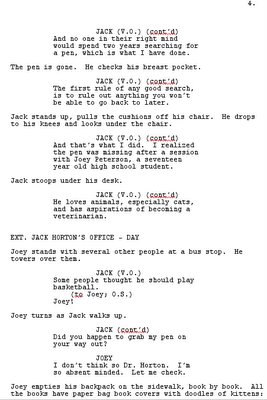CONGRATULATIONS
We’re over half way there.
Today, we’re going to go over the structure of screenplays in a little more detail so that you can review your scene list or beat sheet and rewrite it, strengthen it, or just make more sense of it.
A screenplay has three acts (or, as some would argue 4, or maybe 10, or maybe 2—we could spend all day—just go with me for now and we can discuss it later).
The first act setups up the main character, their world (the ordinary world), and something that falls out of balance. The first act is also where your theme is introduced. This could be as simple as a scene where your protagonist’s buddy mumbles, waste not, want not, (or something less cliched), and thus your screenplay exploring the depths of moderns societies’ throwaway culture is set to be probed, pinched, and tossed.
The inciting incident occurs within the first act. This point can vary from the opening scene, to the middle of the first act, to the end, near turning point one. The end of the first act is marked by turning point one, an event which thrust your protagonist into…
…the second act. This is the bulk of your story, where you’ll need to build complication after complication as your hero acts to bring balance back to their life.
One trap to avoid, is having the problem, and your hero’s attempts at resolving the problem, remain flat. The problem must get bigger. The actions your hero takes must get larger. The stakes, what’s at risk, must be raised. Rising tension is an industry word that should become your mantra as you plan and write your second act.
Turning point two is when everything is on the line. Your hero has no where to go, no one to turn to, all is lost. They must face the antagonist at this point in the climax. This is the sword fight, the showdown, the confrontation that settles the main conflict raised in act one.
The third act, or resolution, is where the loose ends are tied up. Typically, good act threes are short. You’ve tied up the main conflict in the climax. What act three often shows is the world we saw at the beginning of act one restored. The universe is back in balance.
THAT’S IT (EXCEPT FOR STEP 5, TOMORROW)
Keep working on those scene lists. Brainstorm new obstacles that you can throw at your protagonist in act two. Really make it hard on them and raise the stakes. Make sure you can carry the problem you introduce in act one all the way through the climax of your screenplay.
With a scene list in hand on April 1st, you’ll be ready to show up at the keyboard and shooting through 3-4 pages of script. This in itself isn’t alway easy, but at least you won’t have to stare at the blank page and wait for the muse to show up.
RESOURCE
Celtx (http://celtx.com/index.html) is a screenwriting and production planning suite available for PC, Mac, and Linux machines. If you don’t have a screenwriting program, Celtix is an excellent choice to help you format your script. When I last tried it, it was free, and I believe it still is, as I could not find any pricing info on their site.
Technorati Tags: screenwriting, Script Frenzy
